
The Nikkei Asia news portal reported that the Japanese company Sojitz will invest in the construction of a new international airport in Tashkent.
According to the publication, Sojitz will start implementing the project this year. The construction is part of the company’s $1 billion infrastructure investment.
The Tashkent airport will be built in partnership with the Saudi company Vision Invest on the basis of a public-private partnership. Sojitz plans to invest tens of billions of yen, or hundreds of millions of dollars, in the project. The company has previously participated in international airport projects in Kumamoto and Okinawa prefectures, as well as on the islands of Palau.
“The project for a new airport in Uzbekistan was approved in August 2025. According to the plan, its opening is scheduled for 2028. The new airport will be able to handle up to 20 million passengers per year and provide more than 40 takeoffs and landings per hour, making it the largest in Central Asia,” the article notes.
Sojitz also plans to participate in other infrastructure projects in Uzbekistan. Together with the Turkish company Ronesans International, it plans to build a large 800-bed hospital, a 1 GW wind farm, and a 1.6 GW thermal power plant in Samarkand.
According to Nikkei Asia, Uzbekistan is the largest country in the region with a population of 37 million. Annual GDP growth exceeds 6%, and tax breaks and incentives are available for foreign investors. The corporate tax rate is 15%.
“As of October 2024, 54 Japanese companies are operating in Uzbekistan, twice as many as in 2019. In June, Sojitz opened its first official office in Tashkent,” the publication notes.
The article also notes that other Japanese companies are actively developing infrastructure projects in Uzbekistan. For example, Toyota Tsusho, through its subsidiary Eurus Energy Holdings, is exploring a site for a 500 MW wind farm and has signed an agreement with NEC to build data centers. Marubeni, in partnership with the UAE, is implementing a project to build a wastewater treatment plant.
In addition, Nikkei Asia reports that Uzbekistan is in talks with Japan’s Ministry of Economy, Trade, and Industry to expand cooperation in the extraction of mineral resources, particularly those of strategic importance.
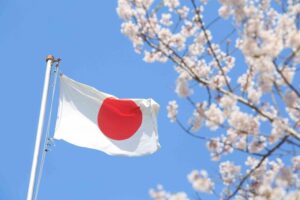
According to a survey conducted by Active Group in collaboration with Experts Club in August 2025, Ukraine has one of the most positive attitudes toward Japan among countries worldwide.
According to the study, 68.7% of Ukrainians have a positive opinion of Japan (33.0% — mostly positive, 35.7% — completely positive). Only 2.7% have a negative opinion, while 26.7% of respondents are neutral. Another 2.0% admitted that they know little about the country.
“Japan occupies a special place in the perception of Ukrainians. It is seen as an example of a country that has achieved great results through innovation, technological development, and the preservation of traditions. This level of trust can become the basis for further expansion of cooperation between our countries,” emphasized Active Group CEO Oleksandr Pozniy.
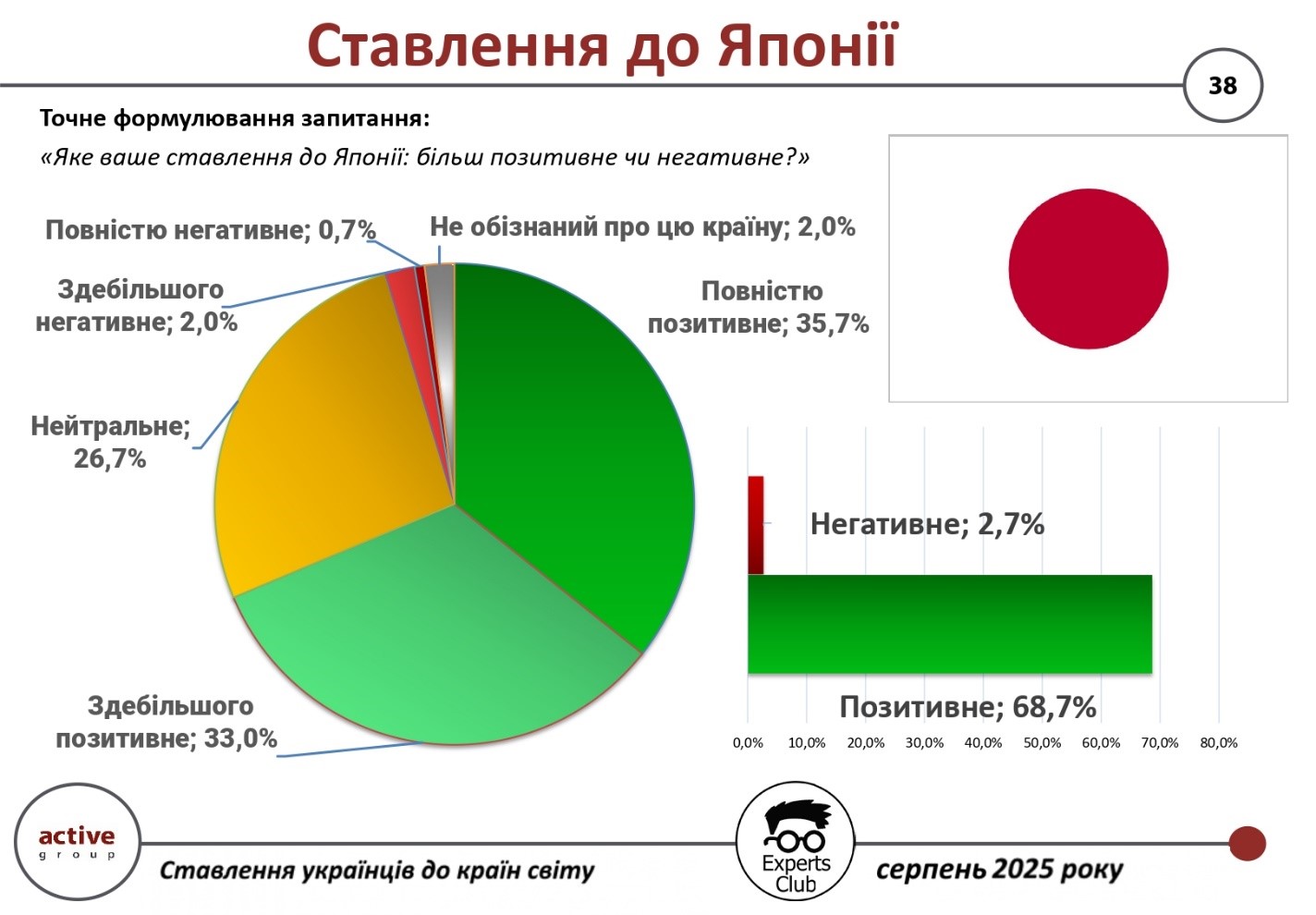
In turn, Maksim Urakin, co-founder of Experts Club, emphasized the economic dimension:
“In 2025, the total trade volume between Ukraine and Japan exceeded $521 million. At the same time, Ukrainian exports to Japan amounted to only $18 million, while imports exceeded $502 million.
This resulted in a significant negative balance of $484 million. Such an imbalance is a signal to look for new opportunities for Ukrainian goods to enter the Japanese market,” he stressed.
The study was part of regular monthly monitoring of Ukrainians’ attitudes toward key international partners.
The full video can be viewed at: https://www.youtube.com/watch?v=YgC9TPnMoMI&t
You can subscribe to the Experts Club YouTube channel here: https://www.youtube.com/@ExpertsClub
ACTIVE GROUP, EXPERTS CLUB, JAPAN, Pozniy, RELATIONS, SOCIOLOGY, TRADE, UKRAINE, URAKIN
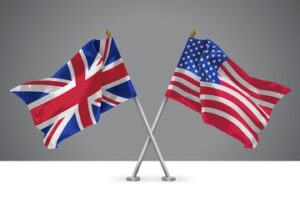
According to the results of a survey conducted by Active Group in collaboration with Experts Club in August 2025, Ukrainians identified priority areas for the development of foreign economic relations.
The majority of respondents – 81.3% – believe that Ukraine should first and foremost develop economic cooperation with the countries of the European Union. The United Kingdom also received a high level of support – 66.5%, while the United States came in third with 62.7%.
Citizens also pay significant attention to Asian countries: 36.2% of respondents support expanding relations with Southeast Asian countries (Japan, South Korea, etc.), and 31.7% with China. At the same time, 29.5% pointed to the importance of deepening cooperation with countries in the Arab and Muslim world.
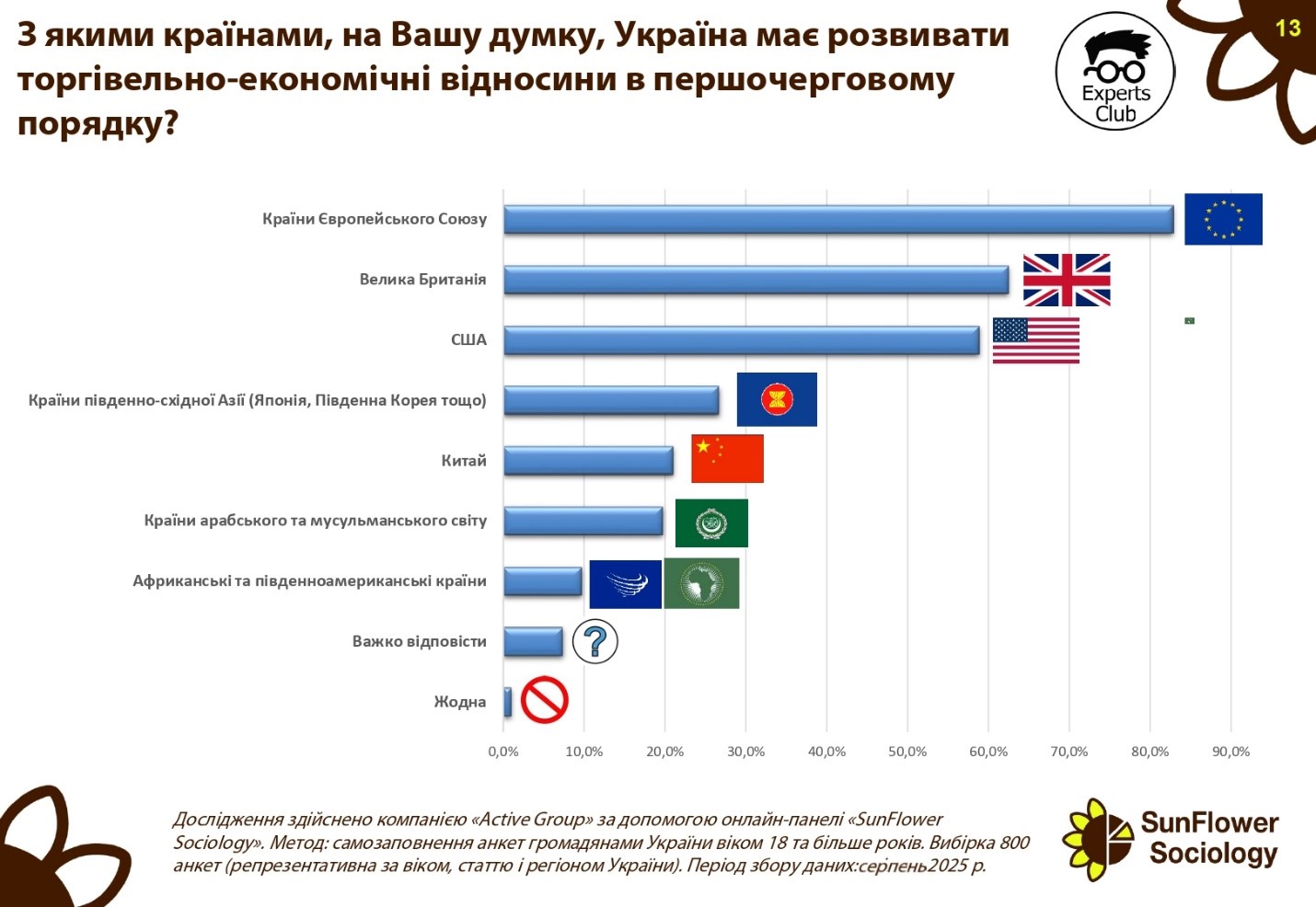
To a lesser extent, respondents are focused on partnerships with African and South American countries — this direction was supported by 14.8% of Ukrainians. Another 8.3% of respondents were undecided, and 1.0% believe that Ukraine does not need any new economic partnerships.
“These data clearly demonstrate the European and transatlantic orientation of Ukrainians in terms of economic priorities. The EU, the UK, and the US form the basis of foreign economic trust, while Asia and the Arab world are perceived as promising but secondary partners,” commented Active Group Director Oleksandr Pozniy.
According to Experts Club co-founder Maksim Urakin, the survey results confirm the real economic structure of Ukraine’s trade.
“The EU is already Ukraine’s main trading partner, accounting for over 40% of trade turnover, but if we analyze individual countries, China remains the leader. The high levels of support for cooperation with the UK and the US reflect society’s trust in Ukraine’s political and economic partners during this difficult period. At the same time, interest in Asia and the Arab world indicates the need to diversify markets and seek new opportunities in the future,” he stressed.
The survey was conducted using self-completed questionnaires among 800 Ukrainian citizens aged 18 and older. The sample is representative in terms of age, gender, and region.
ACTIVE GROUP, Arab countries, CHINA, EU, EXPERTS CLUB, GREAT BRITAIN, JAPAN, Pozniy, SOCIOLOGY, SOUTH KOREA, TRADE, UKRAINIAN ECONOMY, URAKIN, USA

Within the framework of the forum in Japan between businesses signed memorandums and agreements for almost $1 billion, said Deputy Prime Minister for European and Euro-Atlantic Integration of Ukraine Taras Kachka.
“We have calculated that the total cumulative number of those memorandums, documents signed between businesses reaches almost $1 billion. Dialogue with Japan is systematic, systematic and very meaningful,” Kachka said on the air of the national telethon on Tuesday.
Earlier in the Office of Deputy Prime Minister said that on the margins of the forum Ukraine and Japan signed 29 important agreements, in particular agreements on the implementation of joint projects in agriculture and food industry, infrastructure and construction, technology and innovation.
As reported, on August 3, a delegation headed by Vice Prime Minister of Ukraine for European and Euro-Atlantic Integration Taras Kachka arrived in Japan to take part in the event dedicated to the National Day of Ukraine at Expo 2025 in Osaka, Japan.
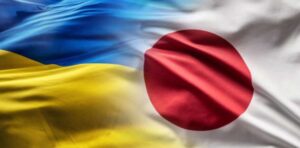
Ukrainian Prime Minister Yulia Svyrydenko and Japanese Ambassador to Kyiv Masashi Nakagome discussed the upcoming Ukrainian-Japanese business forum scheduled for the fall, as well as preparations for the arrival of two Japanese business missions.
“Today I met with Japanese Ambassador Masashi Nakagome. On August 5, Ukraine will celebrate its National Day at Expo 2025 in Osaka. This special event will be an expression of our sincere gratitude to the international community for its continued support,“ she wrote on social media on Friday, noting that she thanked the ambassador for the invitation but would remain in Kyiv, ”where my team and I are finalizing our government’s action plan.”
According to Svyrydenko, at the meeting with the ambassador, “we discussed the upcoming Ukrainian-Japanese business forum scheduled for the fall, as well as preparations for the arrival of two Japanese business missions.” The prime minister noted that work on the investment agreement “is progressing well, and our goal is to sign it this fall.”
Svyrydenko also said that another important topic was Japan’s potential participation in the Cultural Resilience Alliance, an international initiative founded by Ukraine to support cultural recovery and resilience in times of war.
“We deeply value our partnership with Japan and look forward to strengthening our cooperation in the areas of investment, culture, and post-war recovery,” she emphasized.
The World Expo 2025 will be held in Osaka, Japan. It will last for six months in 2025: from April 13 to October 13. The theme of the exhibition is “Designing Future Societies for Our Lives,” with sub-themes of “Saving Lives,” “Expanding Life Chances,” and “Connecting Lives.”

Suziria Group, one of the leaders in the Ukrainian pet products market, has entered the Japanese market, the company announced.
“Suziria Group brands are now present in 12 markets, and this number is growing. Our latest development is Half&Half, which has just entered the Japanese market.
The first batch of products arrived in Japan with the support of our trusted partner Casarich, which acts as the importer. Distribution is managed by their subsidiary Compet, part of the respected Combi Group, known for its expertise in childcare and pet care,” the company said on its LinkedIn page.
Suziria Group is a Ukrainian family-owned group of companies that has been developing the pet products market for over 30 years. It includes Suziria Brands, Suziria Distribution, the MasterZoo pet store chain with 190 stores, and a chain of grooming salons. The company operates throughout Ukraine and abroad, exporting its own products under the Savory, Half&Half, Special One, Pet Fashion, Buddy Boo, Priroda, and Puramur brands.